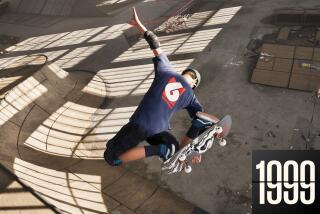Who Can Figure Skatingâs Stand Regarding the Pros?
ALBERTVILLE, France â Menâs figure skating began at the Olympics Thursday with the names Viktor Petrenko, Paul Wylie and Kurt Browning underlined. A skater who could beat them all was sitting in the stands.
âItâs ridiculous,â Brian Boitano said. âAn utterly ridiculous situation.â
The gold medalist four years ago in Calgary, Alberta, he is still the varsity to everyone elseâs junior varsity. But he canât skate here because Olympic skating still isnât completely open to professionals.
Michael Jordan can play Olympic basketball, Chris Evert can play Olympic tennis and any stubble-bearded minor-league goon can play Olympic hockey. . . .
. . . âbut I canât skate,â Boitano said, shaking his head. âIt doesnât make sense.â
It doesnât. But Boitano, 28, is trapped inside the hopelessly snippy politics of the governing International Skating Union. It allows pros in the Olympics, but not all pros.
âTheyâre the black sheeps at this point,â Boitano said of the ISU.
Imagine if things were different. Imagine a menâs competition with Boitano, Brian Orser and even Scott Hamilton. Imagine a womenâs competition with not only Kristi Yamaguchi and Midori Ito, but also Katarina Witt.
âIt would be like the World Series,â Boitano said as the men skated their original programs. âIt would be huge. Awesome. The sport is already big, but this would make it bigger.â
Which begs the question: Why doesnât it happen? Why does skating insist on these prohibitory rules when wide-open professionalism is accepted everywhere else in the Games?
The best answer is this: Skating is what it is, a childish web of politics, pettiness and egos, and woe unto those improperly aligned.
âThey want to control you,â Boitano said of the ISU, âand I just refuse to be controlled. So Iâm speaking out. I hope things will change.â
What happened was Boitano turned pro after winning the gold, competing on a pro championship tour promoted by Dick Button, the broadcaster. The ISU was furious with Button for stealing a big name from the ISUâs big-revenue âTour of Olympic Champions.â
But the ISU did recognize that amateur sports were changing, and here is where it really gets petty. The ISU relented and passed a rule saying skaters could win prize money and still skate in the Olympics, but there was a catch: The prize money could come only from ISU-sanctioned events, and the ISU, still angry, refused to sanction Buttonâs tour.
When the ISU finally did give in and sanction Buttonâs tour a year later, it refused to pardon the skaters who had competed on it before the rules were changed. This wasnât exactly singling out Boitano, but close.
His point is this: Why are they putting the hammer on a popular skater who has done so much for the sport?
âItâs baffling,â he said. âI canât claim to understand it.â
The best explanation is that Boitano is an iconoclast in a conservative sport. He started his own tour of exhibitions instead of joining one of the old standbys, such as Ice Capades. (His tour is in its fourth year, thriving.) He rejects the sportâs traditions. So maybe the sport is getting revenge.
âI could win a lawsuit, no doubt, considering how all the other sports are open to pros,â Boitano said. âBut I canât go to court if I still want to compete one day. Itâs a subjective sport, and the judges are ISU officials. They could just brutalize me.â
What he hopes to do, he said, is organize the top skaters and start their own pro tour, much as the tennis players took over the menâs tennis tour. The ISU would have to relent.
âItâs all about power and money,â Boitano said. âThe ISU has controlled the skatersâ lives for years, and now it doesnât want to admit that things have changed, that once we win an Olympic title weâre bigger than it is.â
Understand, Boitanoâs rebelliousness is not driven by a greedy desire for more Olympic gold. While itâs almost a given that heâd win were he eligible--he is the best jumper in the sportâs history, flawless and elegant and even better now than four years ago--but he had his defining moment in Calgary.
âI canât possibly top that,â he said. âI built up to that for years and skated my best at the most important moment, which is the dream. Iâm satisfied. Iâd just enjoy competing again. I also would like to change the sport for the better. Itâs time.â
Meanwhile, he is spending these Olympics practicing, watching the competition from the stands and writing a column for USA Today . It isnât as frustrating as he thought it would be, he said.
âIt feels like Iâm just sitting this out and Iâll be back in 1994,â he said, referring to the next Olympics in Norway in 1994.
But will he be back?
âI should be,â he said. âBut who knows?â
More to Read
Go beyond the scoreboard
Get the latest on L.A.'s teams in the daily Sports Report newsletter.
You may occasionally receive promotional content from the Los Angeles Times.






